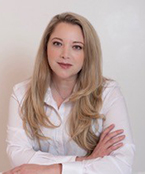From Biomedical Regulatory Affairs Student to Instructor

Ali Bouge
Senior Manager of Regulatory Affairs and Quality Assurance, Department of Pediatrics, Stem Cell and Gene Therapy Clinical Trials Program at Stanford
While working as a clinical research manager at the University of Washington in 2008, Ali Bouge realized that there were many opportunities in research administration and regulation. She decided to pursue these opportunities and advance her career by earning a Master of Science in Biomedical Regulatory Affairs.
“This program introduced me to the vast landscape of regulatory affairs within the United States and abroad,” Ali said. “I learned the foundations of drug and device regulations and how to navigate product evolution from preclinical to postmarketing.”
Since graduating in 2011, she has held a variety of positions in biomedical research and is now an instructor for the UW Certificate in Biomedical Regulatory Affairs and the director for the BRAMS practicum.
“I feel my opportunities are a direct result of the education I received from the Master of Science in Biomedical Regulatory Affairs program,” Ali said. “I am thankful for the experience and the connections I made with the faculty and my cohort.”
Learn how this degree set Ali on her course for success and what advice she has for aspiring students.
What was your favorite course in the program?
The foundation in writing that I gained from Professor Karen Teal’s technical writing classes was extremely valuable to me because I write so much in my field.
Could you tell us about your practicum?
My practicum covered the entire Investigational New Drug (IND) submission process to the FDA for a combination product for gestational diabetes mellitus. This involved meeting with principal investigators, scientists and subject matter experts in various sectors. I outlined and compiled everything per FDA regulations and guidance.
What have you worked on since graduating?
I have held leadership positions within Institutional Review Boards (IRBs), worked for two major research academic institutions, edited and submitted INDs and investigational device exemptions (IDEs) in stem cell and gene therapy to the FDA and worked for the largest stem cell research funding agency in the United States.
What do you enjoy about your career?
I’ve really liked all the jobs I’ve had in this industry because it’s so dynamic and the days are never the same. I’m often presented with content that I don’t have subject matter expertise in. Because regulation is a platform everyone is working around, I know how to handle that content, I can work with different groups and I know what I need to learn in order to do my job.
What do you teach?
I teach students about IRBs and privacy in the Introduction to Biomedical Regulatory Affairs course at UW Professional & Continuing Education. A lot of my work experience has come from IRB offices and research compliance offices. These are topics I have subject matter expertise in and that I strongly feel are important for research.
Why do you enjoy teaching?
I like to show the side of regulation that I’ve participated in. IRB is sometimes brushed over because not a lot of people are familiar with it, but it’s that one last stop before something can be tested on humans. Because I feel it’s such a crucial part, I enjoy sharing the passion I have for that topic. Seeing people at the start of their careers is really exciting. I love teaching and getting people excited about what they’re going into.
Do you have any advice for anyone interested in the field?
Really pay attention to and ask questions about the various career paths within biomedical regulatory affairs. There are so many opportunities, whether it be working for a nonprofit organization, a company or a startup. There are different needs in research and product development. Figure out the path you should take for a particular career in the industry.
Do you have advice for current students?
When you’re in the thick of it, you might become overwhelmed with all the information coming at you. In retrospect, the program taught me how to be resourceful and how to find the information and pathways that I need to follow to get my job done. I don’t remember particular assignments or names of products, but rather the fundamental processes in the industry and about the resources available that will enable me to strategize and figure out the answers.